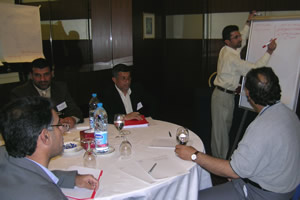Training Government Officials to Manage Conflict
(Written by the late Landrum Bolling, board member of Mercy Corps, about the recent training work of Charles Barker, Paul Cramer and their colleagues. See the Mercy Corps website for more detail.)

Iraqi government officials analyzing current negotiations at Mercy Corps’ conflict management workshop.
Image © Paul Cramer 2006
Amman, Jordan – Recently, a diverse group of government officials from Shiite provinces in south-central Iraq came together here for an intensive weeklong workshop in conflict negotiation and problem-solving.
There were no live reports on CNN. No banner headlines or congratulatory editorials. No discussion of the implications for President Bush’s poll numbers. The quiet, down-to-earth deliberations we saw in conference rooms here could never compete with suicide bombings for public attention and media coverage. But they may just be a signal of better times to come in that tortured land.
None of the participants had to attend, and no U.S. military or government officers were present. The words “nation building” or “spreading democracy” were never spoken, and there was no discussion of American policies and activities in the Middle East, for or against.
For the 25 Iraqis and four American trainers who participated in this Mercy Corps training, it was a businesslike exploration of a broad range of practical management issues: how to negotiate oil-pricing contracts, how to cope with disputes between neighboring villages over access to scarce water supplies, how to calm angry enemies fighting over supposedly “non-negotiable” demands.
The overarching theme of the workshop was learning how to analyze administrative difficulties; how to understand the nature of disputes; how to contain, manage and resolve conflicts.
The trainers — two lawyers, a Christian minister and a former college president — had all worked closely with the late Roger Fisher, the Harvard professor and negotiation guru who is author of the best-selling guide to productive negotiations “Getting to Yes.”
There was a minimum of lecturing or moralizing or political speculation. Actual and theoretical cases of conflict were put on the table for dissection and “negotiation.” Simulated games were played out, often with emotional intensity. Discussions were lively and free-wheeling.
While the American facilitators tried deliberately to avoid discussion of the immediate conflicts within Iraq, the Iraqi participants inevitably kept coming up with references to their own difficulties — and the relevance of the procedures under discussion.
In the end, there was a unanimous request from the group for a longer follow-up workshop with explicit application of Fisher’s methodology to real Iraqi problems.
Just the other day, word came to me from two of the participants that some of the workshop techniques they had learned were tried out, with the agreement of a higher level government official who had asked for help in dealing with an inter-clan conflict that had already produced bloodshed.
Representatives of the two sides were persuaded to sit down together and talk. Methodically, they went through the joint exercise of analyzing the problem, each side listening to the other, both seeking to understand the other’s underlying interests, and searching for a mutually satisfactory deal both sides could live with. It worked.
Not a massive breakthrough for peace, but surely an important lesson, a reason to have hope.
The real question in Iraq today is whether the many unheralded efforts to build honest, capable administrative structures and authentic citizen participation can eventually replace violence and mayhem. There is still time—but not much.
